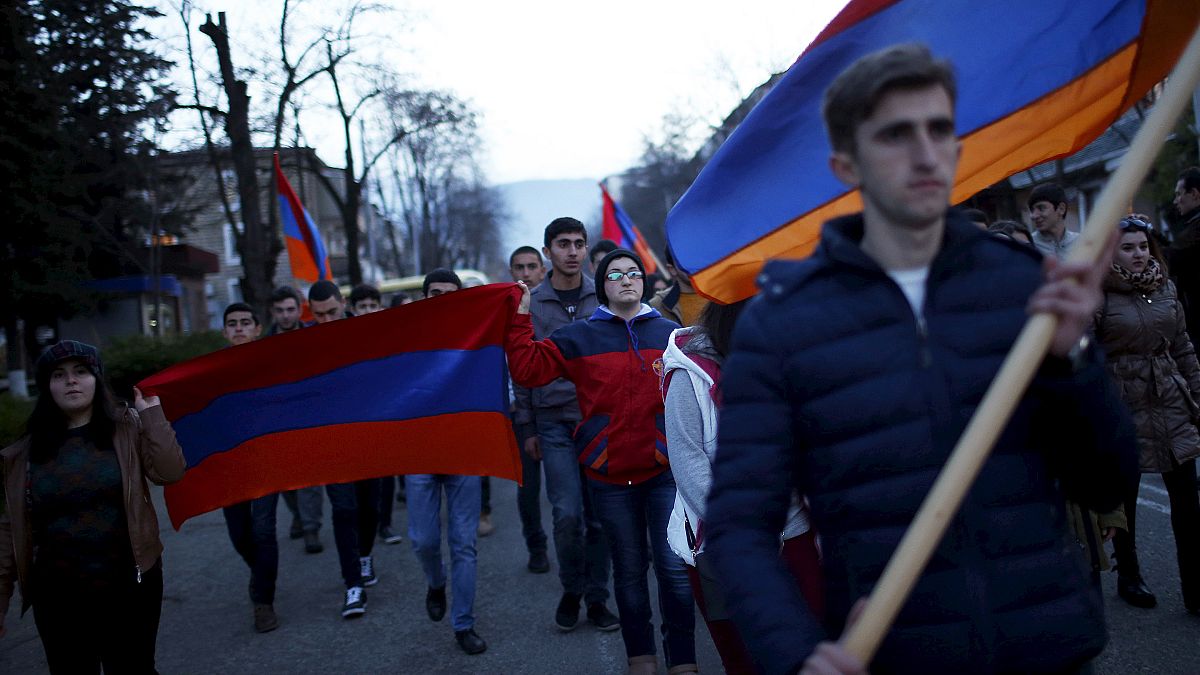This editorial was written by the European friends of Armenia to offer one view on the situation in the Nagorno Karabakh region.
This editorial was written by the European friends of Armenia to offer one view on the situation in the Nagorno Karabakh region. Euronews does not endorse its content
Read the Azeri perspective here
It is more than 20 years since the cease-fire agreement between Nagorno-Karabakh, Azerbaijan and Armenia.
Yet, the Nagorno-Karabakh conflict is still simmering in the South Caucasus, disrupting the lives of thousands of people.
This landlocked mountainous region is still subject to an unresolved dispute between its ethnic Armenian population and its former Soviet colonial master – Azerbaijan.
Historical cultural monuments thousands of years old trace the Armenian heritage of this region.
At the early years of the Soviet regime the region of Nagorno Karabakh was annexed to Azerbaijan as an autonomous region (oblast) upon Stalin’s arbitrary decision, disregarding the will of the people of Karabakh and its history.
Nagorno Karabakh initiated its secession from Azerbaijan through the adoption of Declaration of Independence on September 2, 1991.
This act took place in full conformity with all the norms and principles of international law and the Soviet constitutional framework of that time, that granted oblasts the right to follow that path in a legally binding manner.
On December 10, 1991 the Republic of Nagorno Karabakh held its own referendum: 82.2% of all voters participated and 99% voted for independence. Thus, Nagorno-Karabakh got its independence in the same vein as Azerbaijan and all other former Soviet Republics.
The people of Nagorno Karabakh want to live in peace and exercise their right to self-determination.
By virtue of that right they want to freely determine their political status and pursue their development. Azerbaijan opposes that independence and wants to turn back the clock of history. Nevertheless, the only viable option for the settlement of the Nagorno Karabakh conflict is to let its people live independently, in safety and dignity.
Nagorno Karabakh itself is one of the most secure and stable regions in Europe. Despite the ongoing conflict and dire living conditions imposed by Azerbaijan, the people of Nagorno-Karabakh have succeeded in state-building and development: they established all the necessary elements of the State as required under the 1933 Montevideo Convention on the Rights and Duties of States, such as territory, population, government, and capacity to enter into legal relations.
The people of Nagorno Karabakh organise their political life through elections, democratic institutions, a well-established rule of law system and a vivid civil society.
Six parliamentary and five presidential elections have been conducted that were described by international observers as transparent, competitive, fair and in line with international standards.
Well-established and recognized international organizations such as Freedom House acknowledged that democratic governance in Nagorno-Karabakh has been much better established than in Azerbaijan, which suffers and exports high levels of corruption due to its ruling elite.
20 years of negotiations held by the leaderships of Armenia and Azerbaijan with mediation of the OSCE Minsk Group, co-chaired by the U.S., France and Russia, demonstrated that the irreconcilable positions of the parties and that no amount of additional talks would overcome the impasse.
Thus, independence of the Nagorno Karabakh Republic should be recognized in order to provide strong guarantees for the security of its people.
They fully deserved such recognition. Azerbaijan itself should participate in that process, but constructively and not just to block it. The democratic Nagorno Karabakh Republic deserved it much more than a fully-fledged UN, OSCE and Council of Europe member Azerbaijan that routinely violates all norms and principles of those organizations.
Indeed, to make such a decision on Karabakh would be difficult and hard first and foremost for the Azerbaijani elite.
However, it will not be harder for Azerbaijan than it was, to name just a one instance of secession, for such a staunch French patriot as President de Gaulle, who recognized the independence of Algeria.
This editorial was written by the European friends of Armenia to offer one view on the situation in the Nagorno Karabakh region. Euronews does not endorse its content


